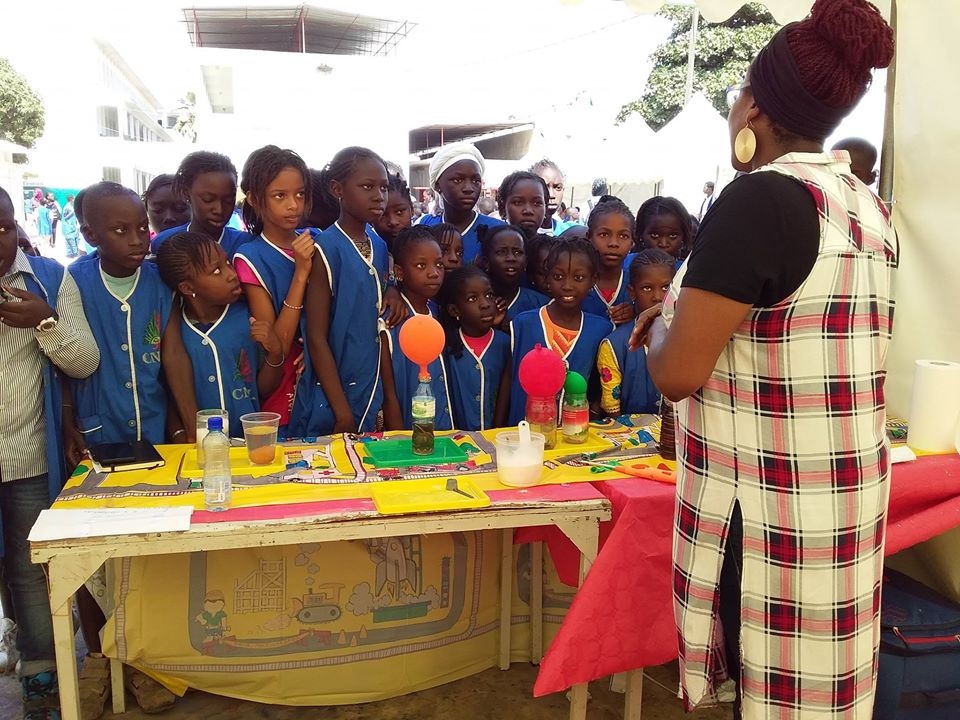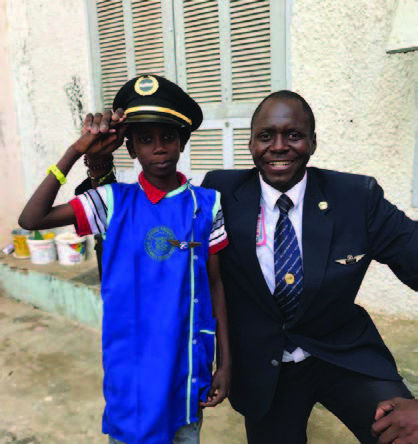When she’s not working full-time as a human interface devices human factors engineer, Marie-Jeanne Steady Ndiaye (’13) is demystifying science and igniting a passion for flight in the hearts of young people in Senegal, Africa.
In 2019, she helped organize the Saly Airshow in Dakar, Senegal. It was the first international aeronautic event of its kind in West Africa and drew a crowd of nearly 3,000. As the co-founder and technical director of the Senegalese Alternative Learning Association (SALA), she’s also working to integrate hands-on science, technology, engineering, art and mathematics (STEAM) projects into Senegalese classrooms.
“On the day of the airshow, a 6-year-old boy came up to me while they were doing aerial performances, and he said, ‘I could never put myself in that airplane. My heart is not meant for that. But I can be the one to build that plane and make it do all of those things.’ That’s the whole point of SALA and the Saly Airshow,” Ndiaye says.

Classroom Change Agent
Ndiaye co-founded SALA in 2017 with her husband, Frederic Ndiaye (’04, ’12), executive director of enrollment, student success and retention at Embry-Riddle, and her best friend Codou Mbow. A STEAM advocacy group devoted to promoting all things science, Ndiaye conducts most of her work for SALA from her home office in the United States, but makes frequent trips to Senegal.
“SALA is a stark departure from Franco-Senegalese methodology, which is very heavy on theoretical teachings,” Ndiaye says. “Ours is a totally different approach to teaching. We’re introducing science at an early age, in fun ways, through hands-on workshops. Our motto is science always, in all ways.”
As SALA’s technical director, Ndiaye creates curriculum and tailors it so it’s relevant to the environment and makes sense to young students. She also networks to find and pair mentors with students and promote workshops.
“Private schools pay us for our workshops, and we use the money to buy materials to do free workshops in underserved and underprivileged communities. We also do workshops in underfunded public schools and in the remote areas where the government almost forgets that there are people,” she says.

Personal Motivation
Ndiaye can relate to the students her program benefits. She says she struggled in school in Senegal, because European teaching methods weren’t conducive to her learning style. After attending a physics and math camp in the United States that involved solving real world problems, everything changed and she excelled.
Ndiaye earned both a bachelor’s and master’s degree in human factors from Embry-Riddle, and has worked for United Space Alliance, NASA (Kennedy Space Center), Embry-Riddle, The Boeing Company and now Apple. She credits her career success in part to Embry-Riddle, for teaching her how to network — a skill she uses broadly today in her role at SALA.
Traveling home to Senegal between semesters in college with kits donated by NASA, Ndiaye led science workshops in community centers, churches and schools. In 2011, the U.S. Embassy asked her to speak with parents of prospective international students about her experiences studying in the United States as a representative for the newly launched EducationUSA program.

Education Game-Changer
Ndiaye believes science can be used to catapult individuals and their families into higher economic and social levels and set them on a path toward financial freedom.
“The reality is, a brilliant young girl living in a remote area is not necessarily prioritizing school, because at about 12 to 13 years old, her father sees her as a financial liability and wants to marry her off to someone who is financially secure. This young girl is not thinking about science and math, she’s thinking about not getting married,” Ndiaye says. “If I can teach her technical skills and turn her from a financial liability to a financial asset, she’s going to be left alone.”